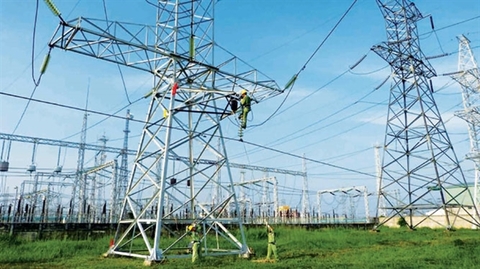
Power transmission systems in some localities are overloaded after a number of renewable energy projects linked up. Experts have called on the Government to allow private investors to instal transmission systems. — Photo moitruong24h.vn
With power transmission lines and sub-stations getting overloaded in some provinces, authorities and experts have urged the Government to allow renewable energy investors to install transmission systems and transfer them to the Vietnam Electricity (EVN) for operation.
Transmission lines, especially in Ninh Thuan and Binh Thuan provinces, have become overloaded after several renewable power plants went online.
Ninh Thuan wants the Government to allow them to build transmission infrastructure.
Many experts agreed with this, saying besides adjusting zoning plans for renewables, the Government should create a mechanism for private investment in transmission systems.
Assoc Prof Dr Bui Quang Tuan, director of the Viet Nam Institute of Economics, said this would address the lack of capital.
Phuong Hoang Kim, director of the Ministry of Industry and Trade’s Electricity and Renewable Energy Authority, told Nguoi Lao Dong (The Labourer) newspaper that with huge sums needed for electricity development and the Government no longer guaranteeing loans for power projects, the private sector should be allowed to invest in some stages.
The Electricity Law stipulates a Government monopoly in transmission, meaning the Government installs, manages and operates transmission systems, he said.
Therefore, the private sector is not allowed to do so.
"Even if enterprises ... build transmission lines and hand over at zero dong, the electricity industry has no mechanism to receive these assets," he said.
The law also stipulates transmission costs should be less than VND100/KWh and subsidised by the Government to keep electricity prices under control.
If the private sector invests in transmission, it would determine the price, which cannot be as cheap as State-regulated rates, but it is not easy to sharply raise electricity prices since they are fixed by the State, he explained.
From the perspective of energy security, Prof Dr Tran Dinh Long, vice chairman of the Viet Nam Electrical Engineering Association, said in many countries power transmission remains a monopoly of the Government because this is the "backbone" of the electrical system.
So, if Viet Nam has a plan to allow the private sector into power transmission, there should be a thorough discussion in the National Assembly before laws are amended, he said.
Transmission lines of 220KV and above should remain a Government preserve, he said.
Transmission lines of 110KV and less and lines from power projects far from existing transmission lines could be opened to the private sector, he said.
In addition to quickly building transmission lines in areas where they are overloaded, the electricity sector also needs to balance transmission from various sources, he said.
For instance, from 8am to 4pm it is preferable for solar plants to transmit power to the grid.
According to EVN, as of the end of June the country had 89 solar power plants with a total capacity of 4,543 MW, far in excess of the 850 MW by 2020 envisaged in the power plan. — VNS